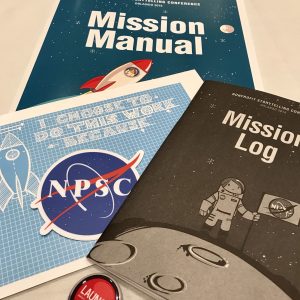5 Nonprofit Storytelling Conference Takeaways
This October was the 5th annual Nonprofit Storytelling Conference, and in our 5 years of attending and participating in this event, we always walk away with big ideas and best practices to pass along. Here are 5 of our biggest takeaways from #NPstory18.
#1 – Stories have the power to help you navigate internal silos and conflict.
Inside your organization, think about the stories you tell. Whether you’re trying to navigate conversations with your executive director, manage board expectations or gather support from peers to initiate important changes, shifts in the way you shape internal stories can move key conversations forward.
In fundraising specialist Peter Drury’s talk, “The Power of Story when Managing Up,” he suggested employing the following strategies:
- Instead of focusing on the 13 complaints you have, look for 1 key insight. Less is more when getting at the heart of an issue.
- Work from the why to the how to the what. When you begin with the why, you can start from a place of shared belief.
- Get the other person to start wondering how to solve the problem too. Cultivating intrigue and changing your frame to discovery helps for other stakeholders to feel like they’re a part of the solution.
- Try a non-divisive approach, like “I notice_________, and I wonder_________.”
#2 – Avoid Nonprofit Navel Gazing Syndrome and show donors the impact of their support.
You do amazing work, you have many different programs that do many different things. But if you just focus on your process and the great work you’re doing, according to copywriter Jeff Brooks, you may suffer from NPNGS—Nonprofit Navel Gazing Syndrome.
Instead, find ways that show your donors the impact they’re having on your work. Brooks recommends you tell your supporters the problem you’re trying to solve—hunger, homelessness, inequality, etc.—and show them the solutions that are possible only when they help. Don’t miss an opportunity to cultivate greater support for your amazing work.
#3 – Connect with your donors using empathy, not sympathy.
Fundraising for nonprofits is all about building connections, and we build connections through storytelling. Lori Jacobwith, professional storyteller and fundraising expert, expressed the importance of empathy in telling the stories of your work.
One of the primary motivations in giving is the desire to be a part of something. So if you’re a nonprofit who serves people, avoid telling stories that make your donors feel sorry for the people you serve. Sympathy—taking pity on someone’s misfortune—is a distant-feeling emotion; empathy bridges understanding over shared experiences or feelings and creates connection. And that connection brings support.
#4 – All strategy is sacrifice.
Nonprofits understand sacrifice. Working with limited resources, nonprofit professionals often sacrifice sleep and work-life balance. But what if you found a way to work smarter, not harder? To work less and raise more? This requires a different kind of sacrifice.
Fundraising expert Steven Screen makes the case for cutting down on the number of things you do—newsletters, direct mail pieces, campaigns, events, donor surveys, reports—and focus on the pieces that yield the most support. Take a critical survey of your to-do lists and see which pieces are showing dividends to move your mission forward. And put your energy there.
#5 – The faster you try to raise money, the less you’ll raise.
Fundraising is about relationships because people give to people. And relationships take time, cultivation, consideration and commitment. No matter which fundraising tools and strategies you’re working with, always remember you’re playing the long game. In the words of Chris Davenport, founder of the Nonprofit Storytelling Conference, “There’s no shortcut to raising money—there’s really only long cuts.” So settle in and enjoy the ride!









